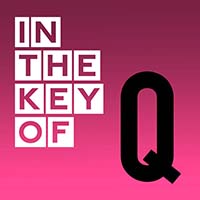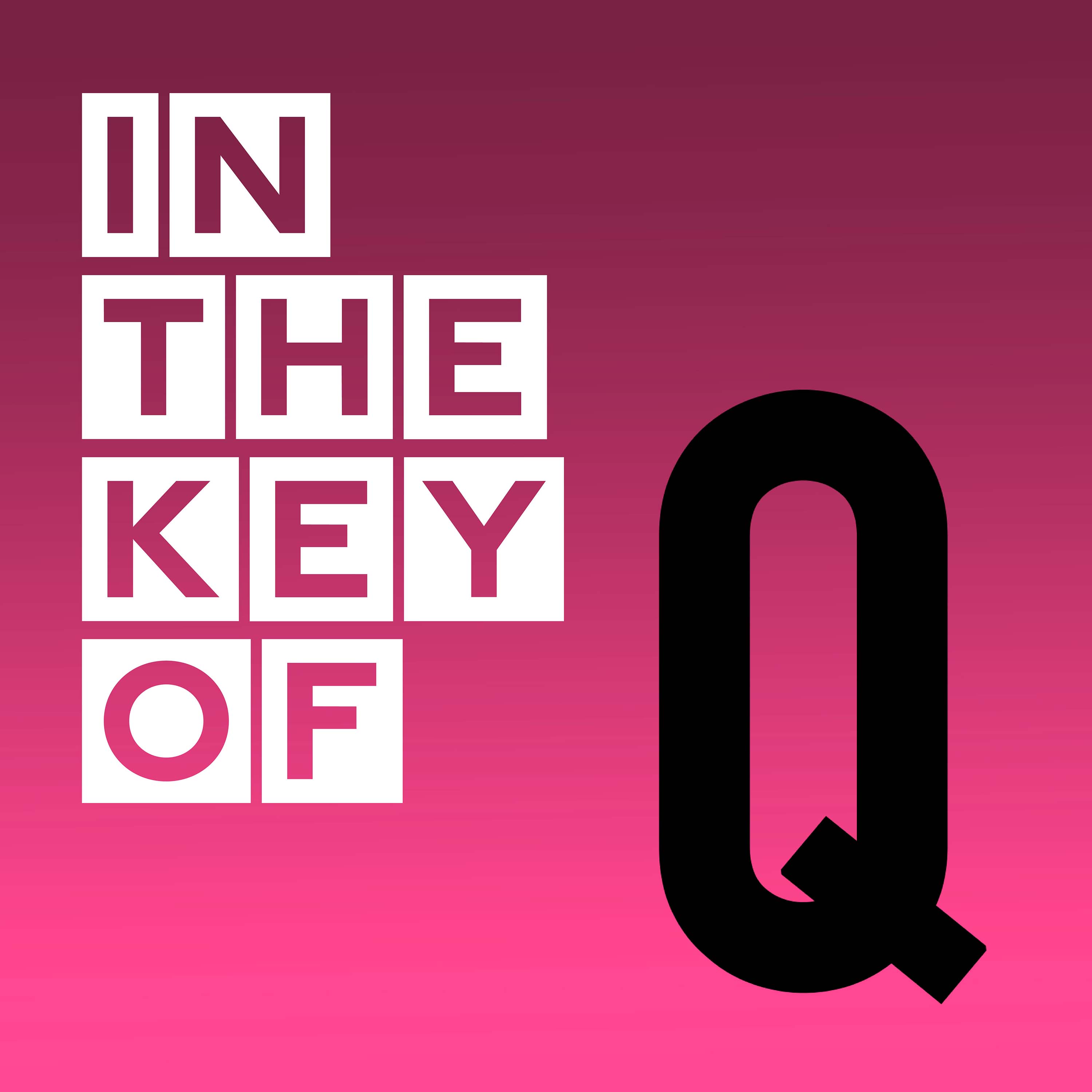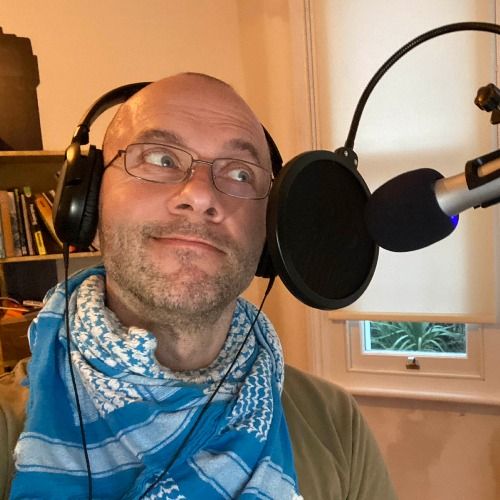Kele Fleming: Melodies, Marginalisation and Musical Metamorphosis
This week, Dan welcomes folk-rock and synthwave singer-songwriter Kele Fleming from Victoria, BC, whose single "In My Dream Alone" has reached 100,000 Spotify plays.
Kele shares her experiences growing up in 1980s Victoria and finding community at the local gay club "Rumours." She reflects on living a "shadow self" before wider LGBTQ visibility and her complex relationship with Pride's evolution from protest to corporate-sponsored celebration.
The conversation explores Kele's experiences as a female frontwoman facing sexism in the music industry and how songwriting sometimes feels mysterious, with melodies appearing almost magically. She cites varied influences from protest folk to pop masterpieces like ABBA.
Kele recommends "Vanishing of Bees" as her gateway track, which explores the dual perspectives of childhood wonder and adult environmental concern.
Find Kele at tinforest.com and on Instagram @tinforestpix.
Spotify playlist can be found HERE.
The podcast is on Instagram (@inthekeyofq) and Facebook (search: In the Key of Q).
Transcript
Dan
Hello there. I'm Dan Hall. Welcome to in the key of Q. By day, I'm a documentary filmmaker, but by night I'm a Queer podcaster celebrating Queer voices and Queer music. I really, genuinely love. Music is an art form that speaks to me. And so I set up this podcast for me to discover new music, and also to amplify some of those fantastic musicians that are out there creating and giving voice to our LGBTQ stories.
::Dan
This week I've got a guest who's a folk, rock and synthwave singer songwriter from Victoria, BC. Her music blends 70s psychedelic vibes, feminist themes and intellectual references. Since the pandemic, she's collaborated with DJ shifting her music career, and she now has over 500,000 Spotify streams with her single In My Dream Alone reaching 100,000 plays. As a proud LGBTQ to a community member, she promotes diversity and inclusivity in the music industry.
::Dan
Welcome to Kele Fleming, Kele. Hello.
::Kele Fleming
Hello. Thanks for having me.
::Kele Fleming
I'm a singer songwriter from Victoria, B.C.. I live on the westernmost point, Western and southernmost point in Canada, on Vancouver Island, on the traditional, ancestral and unceded territories of the Kanaka-speaking peoples, colloquially known as Victoria. And I'm a folk rock and sometimes synthwave singer songwriter. And, I'm thrilled to be here today talking to you, Dan.
::Dan
Thank you very much. Now, what was Victoria like to grow up in? Give us a picture of what you were like as a kid.
::Kele Fleming
Let's see,: ::Kele Fleming
It was kind of my lifesaver in those days.
::Dan
Why were those Queer spaces important to you?
::Kele Fleming
Oh, so important? Because I felt like I could be myself, and I was surrounded by people who accepted me for who I was, where I was, you know, at that time, getting a lot of, non-acceptance from my family at the time. That has amazingly changed over the years. But it was a place where I could be myself.
::Kele Fleming
Meet people who were okay with who I was and dance the night away to amazing music. And I felt safe for the most part. There.
::Dan
When we were younger, we were invisible. We didn't see ourselves in trendy bank advertisements or have, you know, Netflix dramas. We just didn't exist.
::Kele Fleming
It's so true. It was the one space where I felt like I could was a fully dimensional human right. Because as you say, that there just what was like your shadow self was existing in the rest of the world.
::Dan
What does it feel like living that shadow self? Can you give an idea for people who didn't live through that?
::Kele Fleming
There was a lot for me. Hiding myself from others in those days and, not feeling comfortable with talking about who I was and, and not feeling safe to do so in, in certain spaces and, you know, being being quiet in, in social spaces that were predominantly heterosexual and heteronormative.
::Dan
What did Pride mean to you? It's an event. Not. Not as an emotion, but as a as an event.
::Kele Fleming
It was celebratory, you know, it was, it was, a space where I could go with people around me that I felt, accepted me. And I felt safe with, I could celebrate and, be present in the world and maybe prefer that that one afternoon, that pride was happening. I was stepping out of the shadows of of rumours.
::Kele Fleming
The gay club in Victoria and into into the light and into being fully myself in public. So it was important in the way that it showed me that, hey, I, I can't be myself in public.
::Dan
Because I feel I have a bit of a complex relationship with Pride because, like you, I remember pride being this very important day because all my bars and all my clubs, even here in London, were behind darkened glass. All there was, there was just a sense of underground. But when my relationship becomes complex, as I feel, it's also become more and more performative, and I sort of feel a little bit like pride.
::Dan
We're now dancing on the stage for straight people and tourists.
::Kele Fleming
There's been a lot of corporatisation. There's been a lot of, you know, politicians. I feel like it's great they're there and it's become like a kind of a rote thing, at least here and in Canada, where, you know, all the various members of parliament and politicians are marching in the pride parade. But I, you know, you kind of watch them and question, well, what are you doing from a policy standpoint to make sure that, you know, laws aren't passed here in Canada that are anti-trans and, and, you know, so there's that.
::Kele Fleming
I totally hear you in that. I guess one thing I'm wondering is that the character arc of pride to go from being a, a place of protest to something that becomes more mainstream and more palatable to people who may not arrive there on their own, or maybe anti Queer anti-trans. And is that a way to make it palatable so that they can be part of it?
::Dan
I suppose my grumpiness comes from the fact that I don't know where to go to make the political impact that I used to. I don't know where I can go and make a noise about what is happening to my brothers and sisters in Poland, or in Russia, or in any of these place or United Arab Emirates. You know, where I don't have a I don't have a visible and loud platform to do that because I feel like my platform is being drowned out by Kylie.
::Dan
Remixes.
::Kele Fleming
Yeah. Oh, I hear you. Or, you know, floats that are the gap or something like that, right? Corporate the corporatisation of stuff.
::Dan
There is, fantastic guy in this country called Dan Glass who's written a brilliant book called "United Queerdom", and he writes in this book about how ridiculous it is that at the front of pride, you can get people something. And the community groups are put towards the back. But at the same time, branches of BP that are in anti LGBTQ countries, they do not extend the rights of the LGBTQ employees.
::Kele Fleming
I wrote down the title of that book, United Kingdom and BP is the Oil Company, right?
::Dan
Yeah, yeah, but I'm sure it's not just BP. I'm sure all the international companies that are operating in in these countries, and I've heard people say, oh, well, you know, you have to respect the international bollocks. Sorry. Yeah. And if you do do it, fuck off out of pride.
::Kele Fleming
Yeah, yeah. I'm with you on that.
::Kele Fleming
I started as the lead singer of, a folk rock band in Vancouver in the early 90s. Pretty much standard practice would be the folks from the club. So the sound guy. And I'm going to say guy, because it was always a guy in those in those days, would talk to the guys in the band first, and say, so, you know, what's your set up?
::Kele Fleming
You know what you want? And they would always redirect them to me, it's like, well, you got to talk to Kele. She's she's the leader of the band. And you know, so they they would come and talk to me, but, inevitably they would often go back to the guys in the band after talking to me. So there was, quite a bit of that where, you know, even though I was clearly front and centre in the band and the one who was I was the singer, the songwriter and the person who was really kind of drawing the identity, the musical and cultural identity of the group together.
::Kele Fleming
But there was still this kind of silencing of the female voice in the band by the, by the industry around it.
::Kele Fleming
In the U.S. and Canada, there were a few times where I was harassed for. For being Queer. And, I in those days, I didn't present her. I guess I didn't pass as a heterosexual woman. You know, I shaved my head, and I was not wearing, well, what were considered, traditional sexy clothes from a heterosexual point of view.
::Kele Fleming
So especially in university towns, you know, a bunch of drunk guys at shows. I had one. Or they they wanted to beat me up after a show. And, you know, luckily, the guys in my band were like, okay, we're performing a protective circle around you and got me out of the venue. Not sure if it made me angry.
::Kele Fleming
It made it made me feel determined. Having said that, you know, I can't deny the burden or the weight that that places on a person of constantly having to be louder or more presence or more present because of the silencing.
::Dan
And so his music, in a way, being almost like a medication, has a has it been company for you through your life and you've been able to go to it as a, as a space to find solace and to find understanding?
::Kele Fleming
Yeah, I would say definitely. And it's it's funny. Just as you were talking, I made me think of something. It's like, do I find the music or does it find me? I mean, I think that's a question for for artists and songwriters. As an artist, I think it's it's your your role and your gift to to tune in and and communicate and put it out into the world.
::Dan
Have you ever written a song and and and you sort of thought, oh, I'm going to go to bed on the second and then, oh, before I do, I'm just going to pick up my guitar. And of 45 minutes later suddenly think, where did that song come from?
::Kele Fleming
Yeah, exactly. Yeah. That happens. That happens to me a lot. I have to say. You know, sometimes I will a song will come to me in a dream. Not a fully formed song, but, you know, and dreams are so aethereal and can be so fleeting sometimes. So it's almost like at times a feeling of a song or a sound to that I'll wake up with and it'll be in my head.
::Dan
And there was an interview recently I heard with Benny Andersson from ABBA where he said, when he's writing songs and when they're writing songs are ABBA. Sometimes you could spend four weeks on a song and it would still not quite be there. And other times in four hours it would go from zero to pretty much fully formed.
::Dan
I just find that amazing. It's like, where do these melodies come from? Where do your dreams come from? It's wonderful, isn't it?
::Kele Fleming
es as a songwriter and for my: ::Kele Fleming
And we wrote this song, the first song on the album, in 20 minutes. And it's just like we both looked at each other's like, where did that come from? It's pretty magical.
::Dan
I'd love to know. What were your influences? What did you love that have led you to be making this folk rock? Sometimes synthwave music.
::Kele Fleming
The folk rock side, I just I, I love a good protest song. I mean, that I wouldn't say that I'm a protest singer in the sense of, say, you know, somebody like, Woody Guthrie or or Bob Dylan, but. Or maybe in the Shinade O'Connor vein, or I love that she always considered herself a protest singer first, before pop star.
::Kele Fleming
It's the the power of song to tell a story. And, in a in a melody that, can soften the blow of truth. I loved Annie Lennox, and loved the eurhythmics music, Culture Club. You mentioned ABBA a few minutes ago. You know, when I was a kid, I loved up. They were my favourite.
::Kele Fleming
And I again, it was like the. It was the melody. They they wrote such amazing melodies and then the the vocal harmonies in the way the songs were delivered were, I just think pop masterpieces. So that that was a big influence. And I think, you know, if, you know, people are listening to the podcast thing, what's she talking about?
::Kele Fleming
Like her music doesn't sound anything like ABBA. I think the thing that inspired me about them was their ability to craft amazing melodies. And I, I'm such a believer in melody and the importance of melody and songwriting.
::Dan
So then. Kele, what would you say to your 15-year-old self if you could meet them? And what do you think they'd think of you now?
::Kele Fleming
I love this question. You know, I, I doing a, a live stream, this podcast myself every, every Monday called Musical Mondays. And so I interview very different indie musicians. And that's often a question I ask them. And so I love that I'm being asked this question to, what would I say to my 15 year old self?
::Kele Fleming
I would say, don't let the bastards grind you down. Just keep going.
::Dan
And what do you think they'd think, though, if they looked at you now, would they go, that's me? Or would they maybe not recognise themselves?
::Kele Fleming
No, I think they think that's me. I think they might look at me and say. Why did it take you so long to get to where you're at? That that might be because I think I was, my 15 year old self was pretty impatient, or my younger self was impatient, but, yeah.
::Dan
I think I think your younger self should give yourself a bit of a break. Yeah. What took you so long?
::Kele Fleming
Okay.
::Dan
Now that one of my main ambitions for this podcast is to amplify fantastic Queer voices in their music and for most of the artists, I think, who guest on the show, they won't have been heard by the listeners. So what would be a fantastic gateway song from your catalogue? That is just a beautiful way to bring people into your music, so they can then dig deeper and find all the wonderful stuff that you create.
::Kele Fleming
Cool. I would, I guess maybe I'd go with Vanishing of Bees. I feel like it speaks to a recurring theme in my music. So I love of this planet we call home and the urgent optimism I feel that we need, to save this beautiful place we live. And the song is written from the a dual.
::Kele Fleming
There's a dual perspective in the song. It's written from the point of view of a child, and the point of view of the adult and the child is, in love with the world around them and discovering the magic of the natural world. And the adult is scared and grieving that that magic is leaving, or that we're losing that magic, or that we're destroying that magic.
::Dan
Kele Fleming, thank you so much for coming and guesting on In the Key of Q. Before we go, though, can you tell us where you can be found online?
::Kele Fleming
You bet. Yeah. Thank you so much for having me. I loved our wide ranging chat and discussion. So fun. My website is Tinforest.com, and you can find me on Instagram where I'm probably the most active at tinforestpix and I'm also on Patreon. I'm kind of shifting my focus away from social media and onto Patreon.
::Kele Fleming
So I have, free tier and subscription tiers too, so get access to all kinds of musical goodies.
::Dan
Kele, thank you so, so much for guesting. It's been really wonderful to have you on.
::Kele Fleming
Thank you so much. Great to chat with you.
::Dan
And to everyone else, thank you very much for listening. A huge thanks to the wonderfully talented Paul Leonidou, who did our opening and closing theme tune. Thanks also to Moray Laing. Of course, we're continuing to support the show, and of course a massive thanks to today's guest, Kele Fleming. Do keep subscribing. Give us a five star review and I'll see you next Tuesday.
::Dan
And of course, if you have any notes or any questions or just a comment, you can always just email me on in the key of q@gmail.com. And of course, that's the same email address to use if you'd like to guest on the show as well. Take care.


